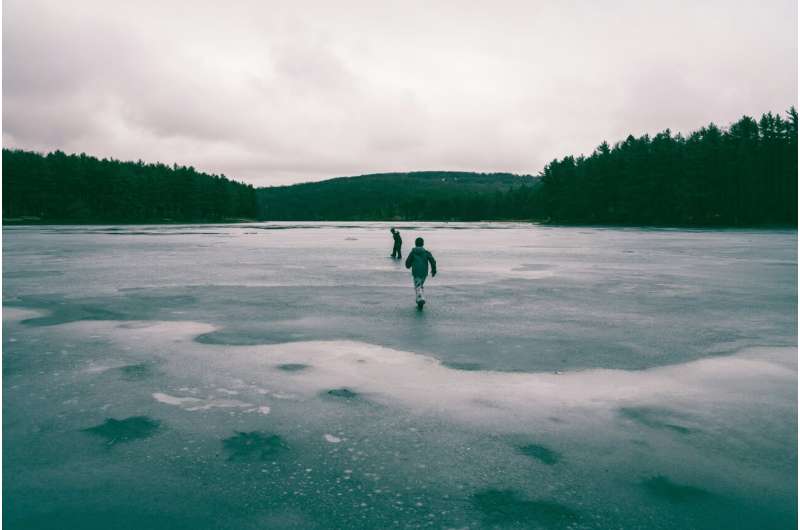This article has been reviewed according to Science X's editorial process and policies. Editors have highlighted the following attributes while ensuring the content's credibility:
fact-checked
trusted source
written by researcher(s)
proofread
Lakes don't sleep in winter! There's a world living under ice

In cold-winter regions where air temperatures remain below zero, a layer of ice blankets lakes for several months.
We might think that not much is happening beneath the surface of frozen lakes in winter.
But that's far from reality.
Many animals, microbes and algae remain active under lake ice. This is why we can enjoy ice fishing every winter.
Lake ice cover acts like a layer of insulation, offering protection against the cold. However, if the ice turns white or is covered by snow, light penetration is further reduced under lake ice.
Although aquatic life remains active under ice, living in the cold and near darkness presents many challenges. Lake food chains reorganize and the entire ecosystem works differently under ice.
The frozen winter is a unique period in the annual cycle of lakes. But it's not uncommon: the majority of the world's lakes freeze every year!
As researchers in freshwater ecology, we study lakes to better understand how ecosystems work under ice. We propose to shed light on the world living under lake ice.
What do we know about lakes in winter?
Historically, terrestrial, marine and freshwater ecologists have perceived the cold season as a period of "biological dormancy." This rather simplistic view, combined with the logistical challenges of collecting samples under snow and ice, has dampened scientific motivation and hampered progress in winter ecological research.
Today, we know that there is more activity under lake ice than previously thought. Although it is now fairly well established that lakes do not "sleep" in the cold season, the fact remains that we know much less about lake ecology in winter than at any other time of year.
Among other things, we know that many microorganisms remain active under ice. Some microbial activities even benefit from winter conditions, facilitating the transformation of nutrients to make them more "available" for spring algal growth. Just like the fertilizers we add to our gardens, these nutrients play an important role in stimulating growth at the base of the food chain when winter ice disappears.
Winter can also benefit the life cycle of certain animals. Instead of choosing dormancy or migration, many invertebrates and fish remain active under ice to take advantage of a calm period with reduced predation and competition. Winter activity also confers a great advantage: winter-active animals are the first to access abundant fresh food in the spring.
'What do animals eat in winter?'
Due to the low temperatures and light levels under ice, aquatic plants and algae perform little photosynthesis in winter. As a result, many herbivores must find other food sources, or develop winter survival strategies, such as building fat reserves.
This is what some species of zooplankton (microscopic animals suspended in water) do: they accumulate healthy fats (such as omega-3s) from algae during the autumn and rely on these reserves to survive when food becomes scarce in winter. Similar to bears, zooplankton can also transfer their winter fats to their offspring to help them grow in the spring.
Another strategy used by animals to overcome winter nutritional deficiencies is to reduce metabolism and mobility. By reducing energy expenditures, many animals decrease their feeding needs in winter. Some trout species can even choose their winter habitat so as to reduce swimming distances.
Benefits of winter ice
In addition to being beneficial for life and chemical cycles, the frozen winter provides benefits to nature and people.
Winter can regulate other seasons. For example, long and cold winters can lead to shorter and cooler summers in lakes. Indeed, on a global scale, the presence of winter ice has a major influence on summer warming trends in lake water.
Warm summers can favor algal blooms (such as blue-green algae, or cyanobacteria, which can sometimes release toxins). As a result, long and cold winters can help reduce this nuisance and preserve water quality by tempering summers.
Our society also benefits from lake ice in winter. In north-temperate regions, frozen lakes provide recreational activities such as ice skating and ice fishing. Further north, where winter is the longest season of the year, lake ice offers important socioeconomic services, such as transportation via ice roads, and can be essential to cultural traditions and food subsistence.
Therefore, winter ice is valuable for us, too.
Ice melt
With global warming, we often hear about the melting of the ice pack in the Arctic Ocean. Although less covered in the media, freshwater ice is also declining. And more rapidly than previously thought.
According to our records, lakes have been freezing-up later and breaking-up earlier for at least two centuries. However, recent work has revealed that winter ice has been disappearing six times faster in the last 25 years.
As a result, thousands of lakes in the Northern Hemisphere no longer freeze or only do so occasionally. Canadian lakes are not excluded: the ice coverage of our Great Lakes has never been as low as it was in the winter of 2024. The scientific community is already discussing the consequences of warming winters for commercial fisheries and the functioning of these large ecosystems.
We are only just beginning to fill in the gaps in our knowledge of winter lake ecology. So it remains difficult to predict how lakes will change with future ice losses.
It is only by advancing research on the ecology of lakes in winter that we will gain a better understanding of the consequences of warming winters. This work provides a foundation for developing predictions, as well as strategies for conservation, mitigation and adaptation for both nature and society.
Provided by The Conversation
This article is republished from The Conversation under a Creative Commons license. Read the original article.![]()



















